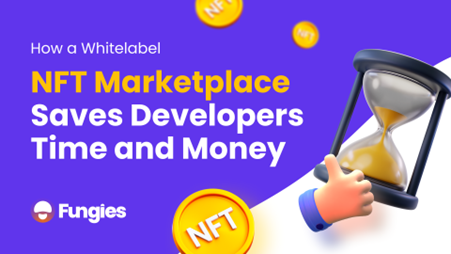Having an NFT marketplace within a game is an essential step in creating a fully fledged metaverse title. The marketplace acts as a representation of the living, breathing economy that exists within your ecosystem. It provides a primary incentive for players to get involved, and advertises the game effectively to newcomers.
By being able to buy, sell, and swap in-game digital assets, players can earn through the time spent and skill shown when playing the game. A in-game marketplace also cements the value of the in-game NFTs like skins, avatars, collectibles, and items that the developer has built into their game
Obstacles to Having an NFT Marketplace
Installing a fully functional NFT marketplace in a web3 game, however, is a lot of effort – particularly for game developers with no experience with the blockchain. Adding in web3 functionality in-house is expensive and time-consuming if your studio does not have the skills required. And, even if they make the expense, they may end up making poor choices and massing technical debt that costs time and money to solve later in the game’s lifecycle. This is particularly true in blockchain, where multiple layer-1s compete to be the substrate on which the gaming metaverse hangs, and future interoperability can be problematic if trends in blockchain gaming change.
That’s why using a whitelabel NFT marketplace is a better solution for studios. These solutions have longevity, customizability, and efficiency. They immediately allow game studios to turn their title into a web3 enabled game and begin to reap the benefits all the metaverse is due to provide.
Fungus Whitelabel NFT Marketplaces Makes Things Easy
Fungies creates full-stack whitelabel NFT marketplaces that integrate into gaming projects and help them transition into web3 in a few simple steps. Fungies set of APIs connect to the Unreal and Unity SDKs and let game devs stay in their natural environment while adding NFT assets, wallet logins, and the NFT marketplace to their games.
The NFT marketplace comes with its own subdomain, can instantly import NFT game assets (which Fungies also helps developers create), and allows projects to set their own transaction fees. The marketplace can have entirely custom branding, and projects can choose from their own set of filters and options to give users access too.
Activity in the marketplace can be easily monitored through Fungies’s simple and intuitive dashboard that works multi-chain, so whatever blockchain you’ve chosen to build on, Fungies works. In future, as the multi-chain grows, Fungies’s marketplaces will easily allow multi-chain trading if a game expands and chooses to live on multiple layer 1s. No technical debt incurred, just fluid web3 integration.
That fluidity extends to the players too. With their Fungies wallet, players can access multiple game titles through a username/password system. The Fungies wallet will support multiple currencies, so users can pay in their preferred crypto when purchasing NFTs from in-game marketplaces. The Fungies wallet also has a social ecosystem, binding users from multiple games into one larger community.
Open Up a Broader Community with Fungies’ Ecosystem and Tools
Studios choosing to use Fungies’s set of tools will thus gain instant access to a broader community of Fungies’s gamers that provides visibility and uptake of their new game launch. Liquidity from other gaming marketplaces will flow more easily to a new Fungies’s project, as the interoperability and shared community between them mean players can always find new experiences in the Fungies metaverse.
Whitelabel NFT marketplaces are a great way to get your game into web3 with the minimum of fuss. Tools like this are needed so that more talent and innovation can adopt web3 and build new experiences in the metaverse that have never been seen before. Fungies is building those tools. It’s not just a marketplace, Fungies is a complete suite of tools that let any game studio, no matter how big or small, leverage the digital ownership of the blockchain in their games.
